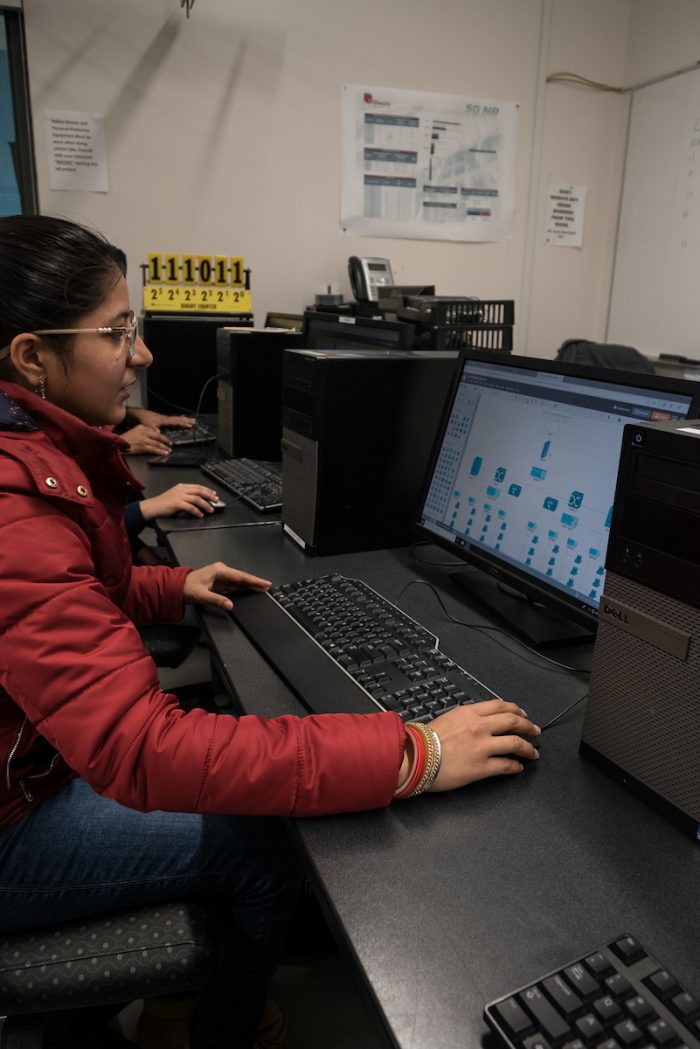Prepare for a career in the exciting and innovative field of artificial intelligence (AI) and data analytics. Graduates of this two-year post-graduate program will be equipped with the knowledge and specialized skills in AI and data science needed to design and build data-driven systems for decision-making in the private and public sectors.
Note: This is a non-funded program and is therefore not OSAP eligible.
Find your career
AI and data science professionals find careers working in a range of sectors, including consulting firms, financial services, government and authority, international organizations/non-profits, technology, and research.
Develop essential skills in the following:
- Statistical modelling and inference
- Machine learning
- Data visualization
- Data warehousing
- Business intelligence
- Computer vision
- Python
Experiential learning
Through training in predictive, descriptive and prescriptive analytics, gain the knowledge needed to design and build decision-making systems based on AI and data science. Get hands-on skills in the following:
- Learn how to collect, manipulate and mine data sets to meet organizational need.
- Acquire skills for designing and applying process-specific data models, as well as for developing software applications to manipulate data sets, correlate information and produce reports.
- Gain experience identifying and assessing data analytics, business strategies and workflows to respond to new opportunities or provide project solutions.
- Develop skills in data analytics, business intelligence tools and research to support evidence-based decision-making.
- Practise developing AI models and agents that use enterprise data to identify patterns, provide insights, recommend actions or perform tasks autonomously, on behalf of stakeholders.
- A co-op work term or experiential learning opportunity of an academic program of study provides students with relevant and applied industry experience.
Co-op work terms are valuable work-integrated learning experiences that allow students to demonstrate their skills in real-world environments with industry support. The market for co-op employment is competitive, and students are expected to participate actively in their job searches. Students, with support, will be expected to identify and secure a co-op work term experience. Co-op work terms are subject to student eligibility, availability, and program review. If unable to secure or participate in a co-op work term, students will complete an alternative experiential learning opportunity.
- Semester One
- AISC1008 AI Principles and Best Practices in Canada
-
Students will learn about the principles of AI and data science and how to apply best practices to their work within a Canadian context.
- AISC1004 Deterministic Models and Optimization
-
The main objective in this course is to give students a thorough grounding in optimization models, theory and algorithms. The course level is introductory and the scope is broad, so only the most important and representative models and algorithms will be covered. The presented material will be closely linked to modern statistical methods such as network analysis, Quintilian regression and high dimensional statistics.
- AISC1003 Machine Learning 1
-
This course is an introduction to some of the basic techniques of machine learning required for data science. It provides a solid training in computational algorithms for supervised problems (classification and regression), such as decision trees and forests, support vector machines or nearest neighbours. The course includes a hands-on component that focuses on the use of scientific scripting languages, and special attention is devoted to Python language.
- AISC1002 Maths for Data Science
-
This course introduces fundamental mathematical concepts relevant to data and computer science and provides a basis for further study in data science, statistics and cyber security. Topics covered include probability (sets, counting, probability axioms, Bayes' theorem); optimization and calculus (differentiation, integration, functions of several variables, series approximations, gradient descent); linear algebra (vectors and matrices, matrix algebra, vector spaces); and discrete mathematics (induction, difference equations). This course makes connections between each of these fundamental mathematical concepts and modern data science applications, and introduces Python programming for data wrangling, algorithms and visualization.
- AISC1007 Python
-
This course covers the fundamentals of Python and explains why it's the best option for data science projects. Python has long been known as a simple programming language to comprehend from a syntax point of view. This course covers an introduction, data structures, data manipulation, data exploration, loops and conditions, data visualizations, and Plotly and Python dash.
- AISC1001 Statistical Modelling and Inference
-
This course presents concepts of probability and statistics. Probability and statistics form the basis of data science. The probability theory is important for predicting. Estimates and predictions form an important part of data science. This course explains how we can make estimates for further analysis using statistics. This course covers the fundamentals of statistics such as central tendency theorem and types of distribution.
- Semester Two
- AISC2003 Advanced Analytics
-
This course presents concepts of advanced analytics techniques such as ensemble learning, density based clustering, fuzzy clustering, dimension reduction, bagging, gradient boosting, sequence mining and streaming analytics. This covers ensemble methods using multiple learning algorithms to obtain better predictive performance than could be obtained from any of the constituent learning algorithms alone.
Prerequisite: AISC 1002
- AISC2004 Data Storytelling Techniques
-
This course will cover the fundamentals of effective data-driven storytelling. Students will learn how to detect and articulate the stories behind data sets and communicate data findings in visual, oral, and written contexts for various audiences and stakeholders. Students will become familiar with associated tools.
- AISC2001 Data Visualization
-
This course presents concepts of data visualization and explains visualization tools. This course will cover topics such as various data sources, metadata, data preparation, joints and data blending. Basics functions such as sorting and filtering will be covered in this course, and techniques such as drill down and hierarchies, reference lines and tend lines will be explained.
- AISC2002 Data Warehousing and Business Intelligence
-
In this course, students will get an overview of modern solutions for storing and analyzing big data, as well as hands-on practice working with databases, building systems to collect data from the internet, and creating live web dashboards. Students are encouraged to think creatively and use knowledge from other courses during the first term to come up with an informative display of data that they can create with dashboard tolls taught in class.
- AISC1009 Leadership and Emotional Intelligence
-
This course will enable students to increase their personal leadership styles through self-assessment. Students will employ emotional intelligence frameworks to increase self-awareness and identify patterns of thinking.
- AISC2000 Machine Learning 2
-
This course will introduce the field of machine learning, focusing on the core concepts of supervised and unsupervised learning. In supervised learning, we will discuss algorithms that are trained on input data labelled with the desired output. Students will learn algorithms that underpin many popular machine learning techniques, as well as developing an understanding of the theoretical relationships between these algorithms. Practical learning will concern the application of machine learning to a range of real-world problems.
Prerequisite: AISC 1003, AISC 1000, AISC 1002
- AISC2006 Step Presentation
-
The Student's Term-End Presentation (STEP) helps the learner to logically arrange theoretical concepts into areas of practical applications. In STEP 2, all concepts learned in semester two are practised on a live data set in the form of a group assignment, wherein group participants extract insights from available data using conceptual learning attained thus far.
Co-requisite: AISC 2000, AISC 2001, AISC 2002, AISC 2003
- Semester Three
- AISC2018 Co-op and Canadian Career Search
-
This course continues students’ trajectories into their co-op placement or future career search.
- AISC2008 Computer Vision
-
This course presents concepts and fundamentals of computer vision. Topics such as image processing will be covered. Computer vision techniques such as object detection, object tracking and action recognition will be covered, as well as image segmentation and synthesis.
Prerequisite: AISC 1000
- AISC2011 Data Science Project Management and Requirement Gathering
-
This course will enable learners to successfully manage a data science project. This course takes students through data mining activities in the context of project management. The project explains inputs and outputs of all activities helping effective project management of a data science project. As per the project management best practices, it guides students to engage the right stakeholders to help establish data mining success criteria to achieve the business goals.
Prerequisite: AISC 1000
- AISC2007 Deep Learning
-
This course presents concepts of deep learning such a basics of neural networks, deep neural networks and recurrent neural networks (RNN). Topics covered include the fundamentals of artificial neural networks and how to implement them in Python programming language.
Prerequisite: AISC 1000, AISC 1003, AISC 2000
- AISC2013 Deployment of AI Solutions
-
This course will focus on the unit and system testing, model lifecycle management and real-life application of AI. A detailed exploration of the retaining pipeline, how to deploy AI on cloud and the best AI operational practices will be completed.
Prerequisite: AISC 1000, AISC 1003, AISC 2000
Co-requisite: AISC 2007
- AISC2009 Natural Language Processing
-
This course presents concepts of natural language processing (NLP). The concepts of text mining and its applications, the basics of NLP, such as POS, entity recognition, regular expression and how to implement them, sentiment analysis, topical modelling and clustering in text courses will be covered.
Prerequisite: AISC 1000
- AISC2010 Programming and Deployment of IoT Devices
-
This course will explore the market around the Internet of Things (IoT), the technology used to build these kinds of devices, how they communicate, how they store data, and the types of distribution systems needed to support them.
Prerequisite: AISC 1000
- AISC2012 Tools for AI
-
This course will explore the basics of SQL, MySQL, NoSQL and MongoDB. This will cover the fundamentals of Docker and Kubernetes, Data Lake and centralization strategy. Creation and deployment of an API, what is ELK Stake and an introduction to Spark and distributed computing will also be covered.
Prerequisite: AISC 1000
- Semester Four
- COOP3000 Industry Co-op
-
Students will apply their skills in software and database development in a Canadian working environment
Prerequisite: AISC 1001, AISC 1002, AISC 1003, AISC 1004, AISC 1007, AISC 1008, AISC 1009, AISC 2000, AISC 2001, AISC 2002, AISC 2003, AISC 2004, AISC 2006, AISC 2007, AISC 2008, AISC 2009, AISC 2010, AISC 2011, AISC 2012, AISC 2013, AISC 2018, AISC 2016, AISC 2017
- Semester Four (Elective Group 1 )
- AISC3001 Kaggle Competition
-
This course allows students to find and publish data sets, explore and build models in a web-based data-science environment, work with other data scientists and machine learning engineers, and enter competitions to solve data science challenges.
- AISC3002 Professional Certification Preparation
-
Students will work toward certification in the most in-demand proprietary certifications to enhance their employability attributes upon graduation.
Prerequisite: AISC 1000, AISC 1003, AISC 2000, AISC 1002, AISC 2016, AISC 2017
- Notes
- Select 1 courses from above
*Courses subject to change.
Certification Exam Preparation
As a graduate of Loyalist's full-time Artificial Intelligence and Data Science post-graduate program, you will be prepared to write certification exams in industry-relevant software.
Please visit the International Student Fees page for an overview of tuition and ancillary fees.
Additional program costs, such as supplies, travel and parking, may be incurred during workplace visits, etc.
Bursaries and financial assistance
Loyalist has a number of scholarships, bursaries and academic awards available to students. Our International Recruitment team can help you explore your options.
Co-op Work Term Fee
The fees listed above do not include the co-op work term fee ($900). Students are expected to participate actively in securing a co-op work term. If ineligible or unable to secure a co-op work term, students are required to complete an alternative experiential learning opportunity in their final semester and will be assessed a different fee ($2,800). These fees are not added to fourth semester tuition fees; rather, they replace regular semester tuition fees.
Admission Requirements
Required academic preparation
A diploma or degree in computer studies, technology, engineering, analytics, mathematics or statistics from a recognized college or university or equivalent. Data analysis, computer programming (Python), languages fluency and excellent math skills are strongly recommended for success in this program
All teaching within Loyalist is conducted in English. In order to be successful in a program, skills such as communication, listening comprehension, and reading and writing must be at a level sufficient to meet the demands of post-secondary studies. All applicants to Loyalist whose first language is not English, or whose previous education was in another language, will be expected to provide an English proficiency assessment for admissions approval. Details about language and general admission requirements are available here.
How to Apply
International students may now apply to this program by contacting InternationalAdmissions@loyalistcollege.com.
If you are a Canadian resident and are interested in applying to this program, please contact admissions@loyalistcollege.com.










